Episode 11
「スタンド·バイ·ミー」 (Sutando Bai Mī)
“Stand By Me”
Might as well say it now–the culprit was exactly who we expected it to be…kind of. I’m disappointed that the show didn’t use the opportunity to pull a red herring on us and create some real tension, since the hints they gave us made it painfully obvious who the culprit is. The only mystery that really unfolded for the audience was the motivations for Tsukino–it makes sense that she has multiple-personality disorder, but it wasn’t a revelation that made me gasp. We can all feel sorry for Tsukino’s situation, but the desired effect the show wished to achieve was lost due to poor pacing and terrible foreshadowing issues. Instead of all this suspense on trying to figure out who the criminal was, more focus should’ve expanded on Tsukino’s past, preferably in a properly animated flashback. Too much attention was given to the mystery portion, diverting attention away to where Kotoura-san’s true potential lies in–character introspection and development.
It’s Mifune crying over her mistakes that makes this show. It is Manabe constantly worrying about Kotoura even after a fight that makes this show. It is the once detestable Moritani confessing properly and getting rejected, ending in tears and acceptance, that makes this show what it is. Although the story didn’t give nearly enough attention to those moments as they should’ve, they were the strongest moments of the show, giving a glimpse into the inner thoughts and struggles of each of the characters. I could’ve cared less about the results of the mystery–it was always about how the characters would react to the consequences and how they would all grow internally as a result. After all, Kotoura’s powers are to encourage an honest introspection for each character, rather than turn the show into a suspenseful mystery. Unfortunately the last few episodes have failed to capitalize on that strength and as a result, the last arc fell pretty flat. If it were any other show I’d be alright with this arc, but due to the high bar that the show set early on, the last half of the series never met those high expectations.
But then the last episode showed itself and…
Preview
Episode 12
「伝えたい言葉」 (Tsutaetai Kokoro)
“The Things I Want to Tell You”
…it made things a bit better. Just a bit.
Alright, it made things better for sure. First, the obvious.
I shed a little tear for Kumiko when she finally revealed the full side of her story, though I still disagree with the decisions that she made. The world called her daughter a liar, lies and cheating destroyed her relationship with Haruka’s father, and her own resulting cheating was revealed–it’s fully understandable why she would leave at that point, though for Haruka’s sake she should’ve persevered and kept trying to understand her innocent yet persecuted child. Though Kumiko naturally harbored negative and malicious feelings towards Kotoura and her powers, it only added to the guilt that Kumiko had for failing to protect Kotoura, both from outsiders and the dark side of herself. The path of redemption should not be denied for Kumiko even with her deeds, especially since an intense pillow fight paved the way for the healing process to begin. Just as Kotoura took some time to adjust herself to her friends (and still continues to do so), it will take time for those two to heal their emotional wounds and reform their mother-daughter relationship. Judging from the epilogue, those two are well on their way on doing so…though it’s a shame we don’t get to see more of their development this season. Of all the conclusions, this one played out the best, and obviously was the one many of us were expecting to see–above all else, the goal of this show was to show the process of healing and how dark pasts can be put aside, of which the Kotoura family was crown example.
Meanwhile, Mifune finally came out about her true intentions for Kotoura, though Kotoura herself reveals her own “intentions” in the process. As many of the readers pointed out, Mifune executed her role as a “bad guy” pretty badly, as it ended up mending her past scars rather than chase the ill-planned course of avenging her mother. It’s a shame that Muroto still isn’t responding to Mifune’s advances just yet. At least Mifune acknowledges that her subtle methods are ineffective against her best friend, a trait that Kotoura herself sympathizes with. Mifune finally is being true to herself, which symbolically showed itself in the disbanding and reformation of the ESP Club.
Finally…we get Manabe’s confession to Kotoura, or rather his verbal confession. Kotoura knew about Manabe’s feelings, but you just can’t beat a physical confession. Although they didn’t end up smooching and sealing the deal, hand-holding suffices considering how innocent the two of them are. Although it makes me happy that the two of them finally got together, the execution felt tacked on without much buildup to the scene. All I can say is that it could’ve gone a lot better, but at the same time they actually did open up their feelings for one another, which is a feat in itself for most romantic comedies.
All of the above would’ve been fairly great to end any reasonable romantic comedy, but Kotoura-san dug itself a hole by having one fatal flaw–it was too good at the beginning. Romantic comedy traditionalists, you may disagree, but I think that Kotoura-san’s greatest flaw was also its greatest strength. Awkward segue into final impressions GO!
The Greatest Strength Becomes a Flaw
Show Spoiler ▼
As I usually am every season, my coverage of shows is very non-committing due to dark horses rearing their heads to tempt my free time. Last season it was an adorable couple, this season it was an abused psychic struggling to regain the ability to trust. For those of you like me who were among the pioneers to watch this show, to go through that first episode without word of mouth, we were floored. Absolutely floored. A simple 4-koma had managed to completely smack the blindside of everyone watching with its raw and brutal treatment of Kotoura. It was hard watching those first ten minutes, but it provided a very compelling story that suggested one thing–this story was not what anyone expected it to be. People were charmed by its unique approach to a romantic comedy, by the strength and honesty of the main male protagonist, and of course the overall sweet story of a girl beginning her quest at trusting people once more.
The 4-koma suddenly saw a surge in translators hoping to see what would happen next–the next few 4koma strips indicated that at least for the next few chapters, this hook was not a one-shot. Word of mouth spread, and suddenly what was under the radar rose to be a crowd favorite. The next few episodes sustained this drama, continuing to draw people in. Mifune had her hidden intentions that only teased at what she was planning. Moritani drew the ire of the audience with her actions as she introduced herself as a jealous rival. Manabe continued to garner praise as a strong male protagonist who wasn’t a blockhead or a coward. On top of all that, Kotoura continued to drive the plot with her ESP, allowing a deeper, more raw introspection into each of the characters. Things were looking good for the show, with so much potential to strip away the surface of the characters and see the raw thoughts affect the story.
But…something happened. The story turned romantic comedy, and life was cheerful and happy. The issues brought in the beginning of the series were cast aside in order to emphasize the bonding of the group and Kotoura’s healing process. While a relief for those who like the rom com status quo, and in fairness a good strategy to emphasize the good things present in Kotoura’s life, it was the beginning of a fall from an intriguing show to a fairly tame rom com. Many episodes were spent in funny situations like theme parks made for Kotoura, the awkward moments of a first date, and of course the eternal repentance of Moritani for her misdeeds in the past. I’ll admit these situations were really funny and well executed, and that the characters were so likable and energetic, but it created a disconnect between the drama of the beginning and the mellowness of the middle–the story was trying too hard to be two things at once. For it to be an effective story, with the 12 episodes they were given, they had to have chosen a path to focus on. Should it be a really funny romantic comedy, or should it instead focus on the hooks of the drama? Unfortunately such focus was lost.
When the drama started once again, I was hoping for a return to the fairly well-executed drama of before. I was hoping that all the loose ends the story set in the beginning would cleanly tie themselves here in a full-circle manner. However, what we saw was the story trying to stay a comedy while keeping the drama afloat. It didn’t work and it ended up lacking focus–the comedy wasn’t strong enough to elicit the laughs of the mid-section and the drama wasn’t intense enough to satisfy those looking for some serious introspection. The plotlines were terribly predictable, the jokes fairly tame, and a lack of a display of extended stress or worry from the characters despite the situation they were in. Thus at the final episode, all these loose ends that were blocked by bits of comedy had to be tied up quickly, lest an audience be displeased by a terribly done cliffhanger.
Like I said above, all of this would’ve been alright if Kotoura-san had set off to be a “romantic comedy with a twist” as people previously were expecting. Flaws would’ve been more forgivable due to the lowered standards, and the romantic comedy aspects would’ve been more widely received as the norm rather than a roadblock. But instead, Kotoura-san tried, and it is that effort in the beginning that ultimately caused its fall–too high expectations were set on a show that in the end was just a 4-koma after all. I don’t dislike the show for trying–in fact I applaud it for trying to be something different, but the follow-through was not satisfactory enough. Perhaps as a blogger I had set my own standards too high and optimistically, but looking back 12 weeks ago, when I first had my mouth gaping at what was being portrayed on screen, I probably would’ve thought the same thing if I had to do it all over.
But alas, let’s not leave these final impressions with bitter words. Overall, I thoroughly enjoyed each character and their interactions together, where their antics were enjoyable to watch independent of the plot–perhaps the most consistently enjoyable part of the show to look forward to. Two particularly stood out for me, though one is probably more universally agreeable than the other. All the characters eventually shone in their own right, but these two take the cake.
As everyone says, Manabe is one of the strongest male leads anime has seen in awhile, displaying feats of straightforwardness and honesty when the situation demanded it. He was always there for Kotoura and never let down his love for her. One might call it a bit overbearing, but in this case it was a true demonstration of dedication to not let your precious loved one be hurt again. His actions may have been a bit repetitive in the end, but his heart was still honest and true. Of all the people Kotoura needed at that moment, she was lucky to have found the guy whose heart, mind, and mouth were mostly on the same page. It’s refreshing to see capable protagonists like this, and I am proud to see Manabe finally able to express his affections even more openly than before. He deserves that good end.
The other character that garnered my affections though would have to be Moritani, solely for her beautiful combination of being the butt of the group as well as being stuck in a cycle of eternal redemption. Obviously no one liked her in the beginning, but as the series progressed, her antics and her hyper-energetic nature melted away her past wrongdoings. As she continued to stick up for Kotoura no matter what, even going to jail to help her, it was clear that she was trying her best to not just make it up to Kotoura, but instead become one of Kotoura’s best friends. Her love life sucks, but she sucks it up like a true Mori and faces it head-on when the time is right. Those feelings of jealousy and malice are completely gone now, leaving only feelings of regret, guilt, and bittersweet acceptance. It was a show of mercy from Kotoura that changed her life, and as such she consistently pays her respects every episode to that mercy. Since the 4koma is still ongoing, I sincerely hope Moritani finds another person who doesn’t care about her dojo, because I feel that she’s definitely paid off her dues in the short time she’s been given.
Thank you all for following this series to the end with me and giving it a shot. While disappointing towards the end, the actual material itself wasn’t so bad, and I don’t regret starting this series at all. If more shows could be as daring as this, the anime lineup would definitely be much more interesting, varied, and unpredictable. Perhaps fellow aspiring directors and storytellers can take some lessons from Kotoura-san and follow suite–the show dared to be something more, and pioneered a formula that may one day be perfected, giving us the true balance of thrill and story we were hoping for from episode one.
End Card
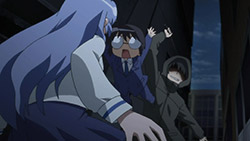
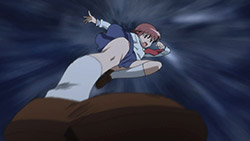
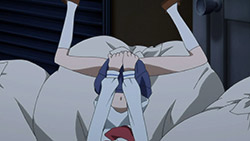
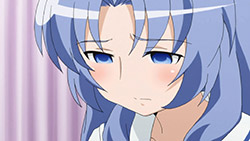
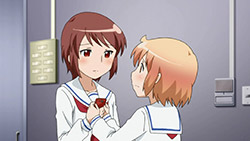
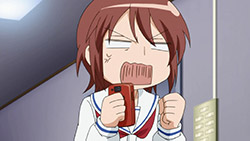
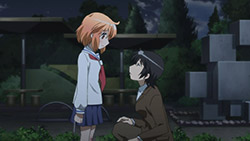
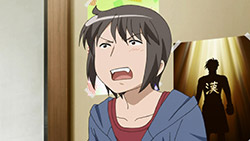
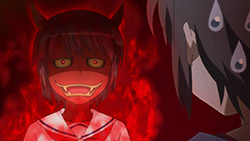
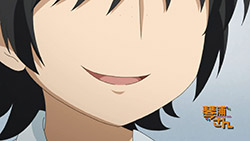
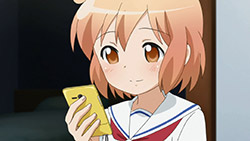
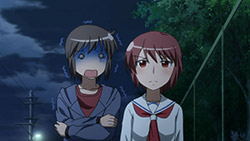
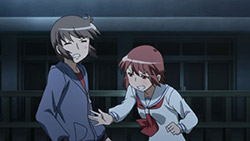
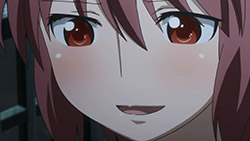
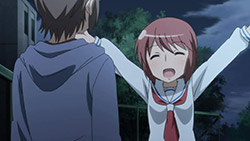
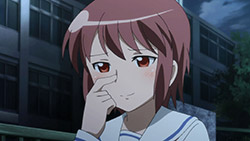
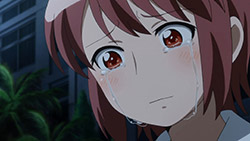
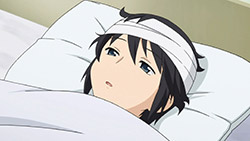
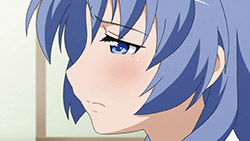
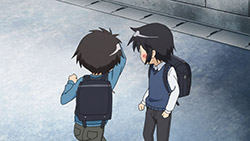
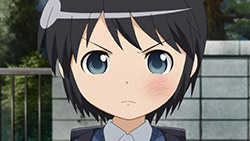

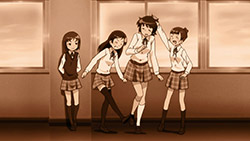
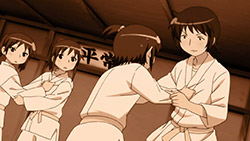
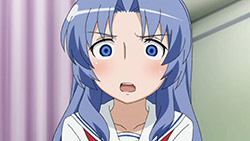
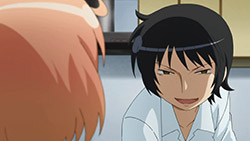
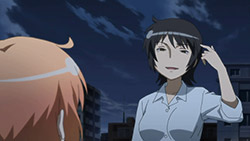
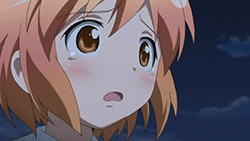
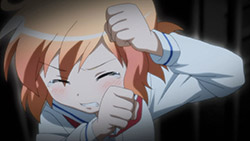
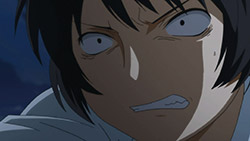
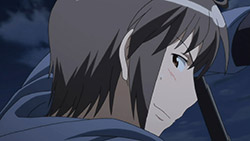
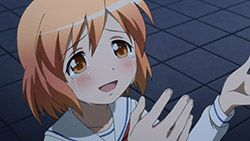
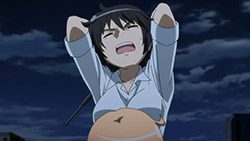
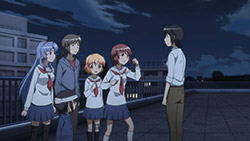
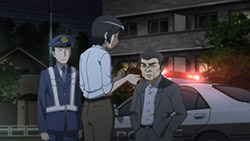
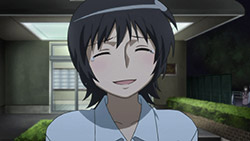
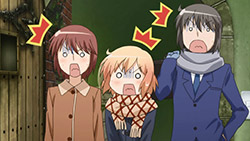
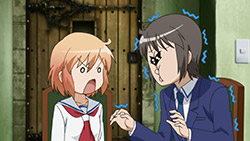
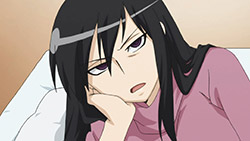


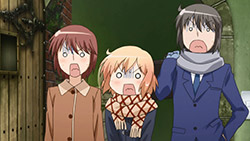
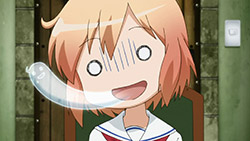
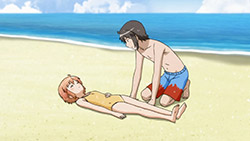
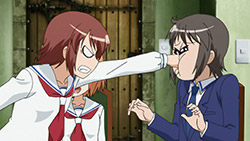
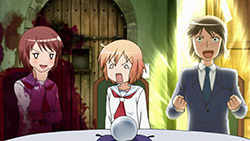
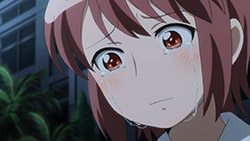
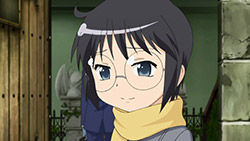
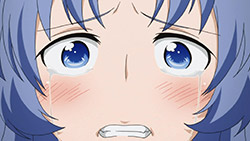
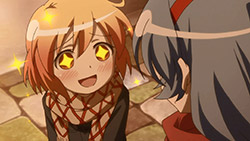
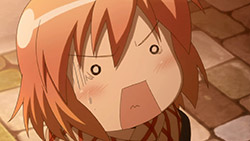
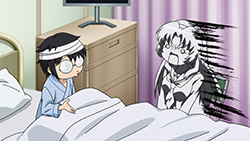
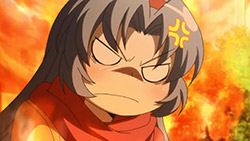
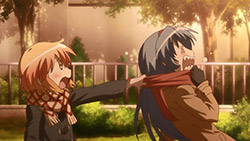

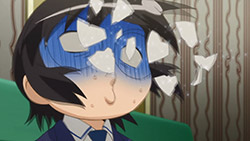

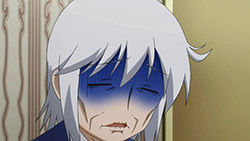
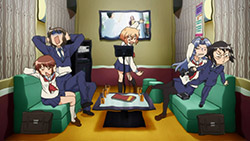
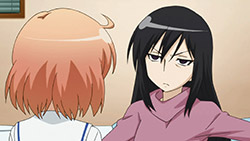
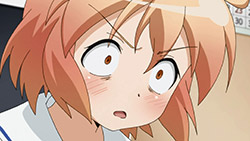
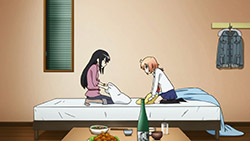
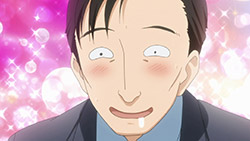
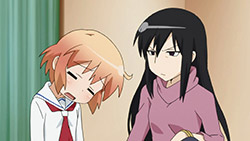
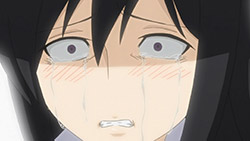
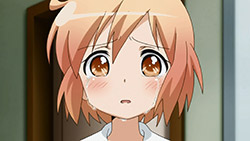
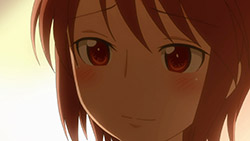
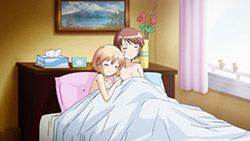
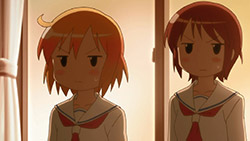
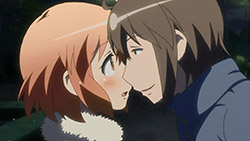
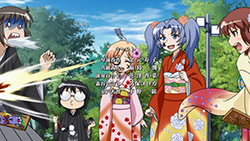
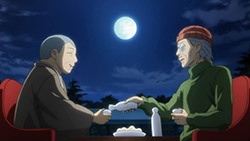
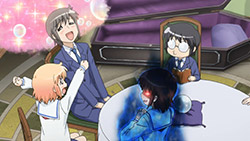
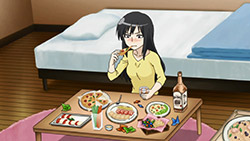
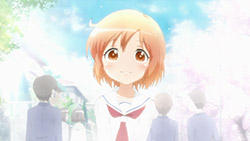
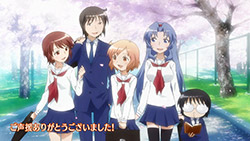

Dramatic, funny, quirky, great. Hope there’s a season 2.
Also, is anyone going to get to the last two episodes of Psycho Pass?
I do suppose expectations can cause our perceptions of a show to become clouded.
Also, as opposed to “setting itself up” as a dark drama, I’d rather liken it to the surprising and more-often-than-not exaggerated openings that are done to hook the audience, ala Ga-Rei Zero. Personally, instead of calling it a lack of focus, I liked the juxtaposition between the dark and comedy moments. It created a very interesting disconnect that I felt was handled pretty well.
Here, I think it was done deliberately in a bid to make the viewer appreciate the lighter and brighter side of life a little more. Like how sweet things taste even sweeter when you first have a taste of something bitter. It also allowed the audience to sympathize with Kotoura and become invested in her character from the get go – and boy was it effective.
Well, in the end, I guess it all comes down to expectations and what you’re looking for in a show. I personally had no expectations to begin with and felt that the show was one of the best surprises of this past season, not unlike it’s spiritual predecessor Mitsudomoe.
I agree with your opinion. I especially liked your third paragraph.
Personally, the OP for the show told me what the show was going to be overall. The more dramatic elements were like an extra bag of candy that I didn’t expect to get.
Overall, this is a great anime that I will remember.
All in all it wasn’t a bad series. But was it memorable? Probably not…
My biggest gripe was with the female cop. Seriously, a tick from her boss and a pizza?
Anyway…
I think the series tried to explore an interesting idea – what if a person could read someone’s
thoughts, but not their intentions? I (think I) see now that the writers tried to illustrate this idea
using Manabe (and her grandfather). He was the pinnacle of that idea – while he fantasied about
doing lewd things to/with Kotora, it’s clear that he would never actually act on those things because
he knew that would ultimately hurt Kotora. But this wasn’t always clear to Kotora, who could “read”
the pervy acts, but not the heart behind it, and was “offended” by them – thus the series’ comedy.
Having said that, its use as a premise for Kotora’s terrible treatment by her mother and (kind of)
shifting some of the blame to Kotora for not understanding why her mother was such a bad mother?!!!
That part didn’t work at all for me.
So I think this series had the potential to explore some interesting ideas, but it really band-aided these
things in the storyline nd it never reached its full potential, IMHO.
Zanibas, thank you for covering this series. Onward to the Spring season!
Eh. The detective arc could have been executed a bit better, I mean, it’s not much of an arc. Stretching it out a bit would have been good. But I digress, I teared up a little on that ending, especially the burnt eggs part xD
I don’t understand all of these reactions to Kotoura-san. The show was always advertised as a silly romantic comedy based on a 4-koma with a psychic main character. Now everyone is upset that it is a silly romantic comedy with the dramatic strength of a typical 4-koma.
I will agree that the first ten minutes of the show and the stuff with Moritani was surprisingly intense but did any one really think a 4-koma had enough substance to engage in deep introspective drama for 12 episodes?
Instead of being happy that a 4-koma adaptation tried something different we are condemning the show for not being the next Shin seki yori or Bokurano. Really? on 4-koma material?
To condense my final impressions into a tl;dr:
It dared to be something more, but then it fell short. I don’t dislike the show for daring, in fact I loved the guts it had to do this, but I’m just disappointed that it didn’t carry all the way through. Hence, I have hope that someone will perfect the formula in the future.
It’s actually surprising that the 4koma format has the ability to generate anything like this at all, so sue me for having hope that the author would use the 4koma medium in a novel way. I like to view this scenario like I do haikus: short, but in no way inable to deliver a poignant statement.
Instead of being happy that a 4-koma adaptation tried something different we are condemning the show for not being the next Shin seki yori or Bokurano. Really? on 4-koma material?
Kotoura-san definitely deserves credit for going outside the typical 4-koma genre. However, at least for me “condemning” is far too strong of a word to describe my view. “Condemn” is far different than “good, but could have been better.” One can be disappointed in something and still not condemn it. I wouldn’t waste my time watching all 12 episodes of a show I “condemn.” Furthermore, I see no reason why viewers should give a “free pass” to any show/novel/movie simply because it tired something different. Execution matters. Even in terms of humor alone, I didn’t find the latter episodes of Kotoura-san as funny or entertaining as earlier ones. FWIW, I’m not new to 4-koma or 4-koma based anime. I’m a big fan of both the manga and anime versions of Seitokai Yakuindomo.
I will agree that the first ten minutes of the show and the stuff with Moritani was surprisingly intense but did any one really think a 4-koma had enough substance to engage in deep introspective drama for 12 episodes?
I understand your point, but as you suggest, the show kept its “intensity” for more than just the first 10 minutes (first 4 episodes IMO). If a 4-koma was able to “engage in deep introspective drama” for three, four or even five episodes, then why is it so implausible that it maintains said drama throughout the season? No question that presenting such material is more difficult with a 4-koma format, but the show clearly demonstrated it was possible. Rather than difficulty due to the format, isn’t this simply a lack of consistency in writing/scripting? There are many examples of novels, movies, TV shows or anime which started off strong, but declined as the story/season progressed.
Even the manga lacked sufficient detail for continued presentation of said drama due to its 4-koma format, there’s no reason why the mangaka couldn’t have collaborated with the shows writers to “fill in the blanks” as needed. Plenty of manga and LN authors are involved with the anime production of their series.
The show was always advertised as a silly romantic comedy based on a 4-koma with a psychic main character.
True, but the first 10 minutes alone completely negated that description. I posted below that in retrospect, the show may have been better served by reducing the intensity of the first 10 minutes so that expectation’s were more more inline with the show/manga as whole. The director chose instead to go with what we saw and viewers expectations were formed accordingly. Given what was presented by the anime, I don’t think comments such as “disappointing” or “could have been better” are unreasonable or unexpected.
This series should have been made into a 2-hour movie or something. The series itself wasn’t bad but the execution of drama and comedy was poorly done.
After episode two, everything went to downhill and there wasn’t any redeeming factors through out the series except for some aspect of comedy.
Frankly, I thought this was okay overall. I found the “drama” heavy-handed and as such I did not really have high expectations for this show. Really, this did just fine as a “slightly different rom com.”
well give ep.11 solve a mystery aka bi-polar anyone who watch degrassi aka eli anyone?
as for ep.12 yea it finally happen kotoura & her mom yea what a drama bomb & reasons give mom did care just feel so guilty a lot things.
overall really truly sleeper hit of season to watch.
her mother was dating a pedobear ..
CLOSURE in an ANIME SHOW?!? WTF!
Kotoura-san was a good show, but like Zanibas, I thought it got weaker as it progress. In some sense, I see the show as a victim of it’s own success (i.e. the first 10 minutes or so of Episode 1). Those first few minutes were so intense, emotional and well executed that expectations went through the roof. I don’t think is possible to keep up such emotional intensity over twelve episodes. If nothing else, the viewer becomes desensitized and detached (unless you’re a serious “S”).
Personally, I was happy that the show didn’t maintain such a dark atmosphere. I’d rather not see Kotoura subject to sadistic treatment over and over for 12 episodes. I thought the show did a pretty good job overall handling the transition from dark drama to “dramady” (if there is such a thing) over the next 4 episodes. Whatever drama was missing was replaced by some very funny moments, and overall, a pretty good balance of the two.
But like Zanibas stated, the show started to lose focus in the second half. The “criminal arc” is a perfect example IMO. Rather than explore the idea of Kotoura being better off without her powers, that issue was quickly dismissed. Instead we got some sort of HS detective show. I don’t mind a happy ending. Nothing wrong with that per se, but in terms of Kotoura’s struggle to be accepted by others and maintain relationships, it all felt rushed. Everything, even her horrible relationship with her mother, was wrapped up quickly and easily. Too quickly and too easy IMO. It’s not the transition to rom-com that’s the problem, but the speed at which it happens.
I liked Kotoura-san. Manabe was a refreshing male lead and stole the show IMO. Still, I agree with those who think the show didn’t meet it’s full potential. I’m not sure whether that was due to the source material itself, or choices made by the anime director and producers. Perhaps both. Looking back on the series, I now wonder whether the show would have been better off in the long run had it toned down intensity in the first 1/2 of EP 01. That scene wouldn’t have been as good, but then expectations for the show might have been more reasonable.
Thanks for covering the show Zanibas. It may not have turned out as some would like, but it was interesting and deserved coverage IMO.
I thought that arc with the female cop wasn’t that bad. I was under the impression that it was made obvious for a reason – the tension wasn’t on WHO it was, but rather what will happen to Kotoura when she is stranded alone with the culprit, and whether the others will be able to figure out the true identity before it is too late.
I think at the end of the day, we may need to take a step back and view this series from afar. Yes, the first few episodes threw this series up to a level that no one would have imagined initially, and that the rest of the series never quite reached that same heights again. However, comparing it to not only 4-koma adaptations, but other series in general, I thought it was one of the better shows of the past 2 or 3 seasons in general.
Enjoyable series, but I think the original premise threw me off a bit. I thought it was going to be much darker. With that said, the rest isn’t terrible and some parts are fairly entertaining. Not bad, but not great.
When Haruka initiated that pillow fight, she pretty much had enough of her mother’s bullshit. All it took was for the mom to transition from being a bitch to be some sort of tsundere for her daughter, as all the shit she did was pretty much her fucking up her role as a mother. Still, seeing her with Haruka is a start of the healing process.
Well, if there’s anything wrong with the show, it’s me who pretty much set expectations towards the end. Don’t get me wrong, the last episode was still nice, but that detective mini arc was just stupid. I honestly thought they would pull off the same effect as of the first few episodes, but I was gravely disappointed.
In the end, this is one show that I wasn’t looking forward to, but due to curiosity, it ended up to be a fun watching experience from start to end.
Even if it was blatantly obvious, I still feel sorry for Tsukino. I wasn’t expecting a multiple personality disorder since it kinda came up out of the blue.
As for Moritani, I finally adore her. My heart broke along with hers during that confession scene even though I saw it coming. It was just so wonderfully done.
Also glad that Kumiko had a bit of her side shown. As horrible as it was, she knew leaving Haruka was for the better since she was becoming unstable. Wish she hadn’t said what she did as she left, though, but I’m glad that she at least still cares.
At the end of the day, Kotoura-san became a rom-com with a slight-but-powerful dramatic hook. Had the first 10 minutes not popped up, this series wouldn’t have had a lot of redeeming qualities to it. The drama hooked the audience in, kept them hooked and made them admit to themselves, “okay, this comedy is pretty typical, but we’ll get to the drama eventually. :3”, the series finally ends, and just sort of leaves the audience saying “it was still a cute rom-com and the drama was still good. I was satisfied.”
The series tried to do something different, which I applaud it for. However, I’m a bit dumbfounded that people are calling this an exceptional series, even saying “best show of the season/past 2-3 seasons” when it was quite clear that it couldn’t keep up with the opening. No, I didn’t expect 12 episodes of pure, utter depression but I didn’t fully expect it to dumb down into a generic romantic comedy for the greater half of the series.
Overall, it’s a pretty stereotypical romantic comedy. The difference is that there’s a hook that suckers me into watching the series when it would have otherwise fell under my radar. I didn’t even consider watching until I saw the post for episode 1.
not bad, Koutura-san, not bad!
Kumiko having a chance of redemption is definitely a nice ending touch – plus Manabe officially confessing!
And no harem-style ending in sight, even if it means some people end up alone (Moritani, cheer up, I’m sure there are plenty of boys out there that think you are cool warrior princess! – myself included)
Solid series, 4/5 stars in my eyes.
I sincerely hope Moritani finds another person who doesn’t care about her dojo, because I feel that she’s definitely paid off her dues in the short time she’s been given.
Don’t you mean “Does care about her dojo”? After all, it was Manabe’s excitement about it that made her like him back in elementary school.
I was actually hoping for the culprit to be Kumiko’s new fiance, since Kotoura’s reaction did imply something fishy about him, and it would set a nice beginning for another chapter of chemistry between Kotoura and her mother (imagine her losing yet another boyfriend because of Kotoura’s ability). But I guess I did raise my expectations a bit too high. Oh well, it’s still a solid little show in the end, even in a bit misleading.
Kotoura-san for most underappreciated, yes please!
That first episode really made an impression.
I will always remember the sadness of part A, then the contrast in part B.
The middle part has the mixed comedy and some seriousness and conflict.
But the art style and character design kind of down-play the conflict, I remember more of the humor compared to shows like Sakurasou, Kokoro Connect and Toradora which I related more to their conflicts.
Tragedy, comedic school life, detective story.
I enjoyed it.
Heya i’m for the first time here. I found this board and I to find It really useful & it helped me out much. I am hoping to give one thing again and help others such as you aided me.